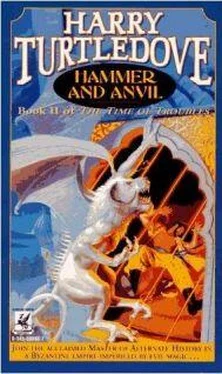"I might have been out there, I said. Before I did anything, though, I went and talked with my sister. For some reason or other, marrying you was what she wanted to do, and I've come to have a great deal of respect for Lysia's good sense. If you have any sense of your own, you'll pay attention to her, too."
"I intend to," Maniakes answered. "If I didn't think I wanted to listen to her when she told me something, this would have happened differently."
"Yes, I can see how it might have." Rhegorios thought for a moment. "Better this way." He nodded judiciously. So did the Avtokrator.
Maniakes looked forward to Midwinter's Day with the same eager anticipation a little unwalled town in the westlands felt on the approach of Abivard's army. He could not hold back the passing days, though, and avoiding the Amphitheater would have been an unthinkable confession of weakness. When the festival came, he and Lysia went out across the plaza of Palamas to the great stone bowl where, he confidently expected, they would be mocked without mercy.
A few of the people in the plaza made a point of turning away from the Avtokrator and his new bride. More, though, treated them with the casual equality that was everyone's due on Midwinter's Day. The two of them leapt over a fire hand in hand, shouting, "Burn, ill-luck!"
Inside the Amphitheater, some catcalls and hisses greeted Maniakes and Lysia. He pretended not to hear them and squeezed Lysia's hand. She squeezed back, hard; she was not used to public abuse.
The elder Maniakes and her own father and brother greeted her warmly when she and the Avtokrator ascended to the spine of the Amphitheater. So did Tzikas, who looked splendid in a gilded chain-mail coat. Parsmanios tried to make his nods to her and Maniakes civil, but did not succeed well. The elder Maniakes scowled at him. Afterward, Parsmanios worked harder at acting friendly, but managed only to pour honey on top of vinegar.
Agathios the patriarch made no effort to be friendly. As far as he was concerned, Maniakes and Lysia might as well not have existed. He did recite the creed to begin the day's events, but even that felt perfunctory.
After the patriarch sat down once more, Maniakes took his place at the spot from which he could speak to the whole Amphitheater. "People of Videssos the city," he said, "people of the Empire of Videssos, we have all of us had another hard year. The lord with the great and good mind willing, when we gather here for the next Midwinter's Day, we shall have passed through sorrow into happiness. So may it be."
"So may it be," the people echoed, the acoustics of the Amphitheater making their voices din in his ears.
"Now let the revelry begin!" Maniakes shouted, and sat down to make as if he enjoyed the lampoons the mimes were going to aim at him. Anything can happen on Midwinter's Day: so the saying went. Usually that meant something like finding an unexpected love affair. But it could have other, more sinister meanings as well.
To the Avtokrator's relief, the first mime troupe mocked only his failure to regain the westlands. He had seen himself portrayed as running away from anything in Makuraner armor-even if it was an old man on a swaybacked mule-and as fouling his robes while he ran: mimes had been making those jokes about him since he took the throne. If he had managed to smile for them before, he could do it again without straining himself unduly.
When the troupe trooped off, he glanced over to Lysia. She smiled back and mouthed, "So far, so good." He nodded; he had been thinking the same thing.
It didn't stay good for long. The very next troupe of mimes had a fellow dressed in gaudy robes and wearing a crown of gilded parchment sniffing lasciviously after a band of pretty little girls played by pretty little boys in wigs and dresses. When he found one who wore a dress much like his robe and a scarf much like his crown, he slung her over his shoulder and carried her away with a lecherous smirk on his face.
The crowd roared laughter. It dinned in Maniakes' ears. He had to sit there and pretend to be amused. As he had warned her to do, Lysia also feigned a smile. But, through that false expression, she said, "What a filthy lie! I'm not that far from your own age, and anyone who knows anything about us knows it."
But most of the people in the city didn't really know anything about Maniakes and Lysia. That was the point. The city mob formed its opinions from things like mime shows and seventh-hand gossip.
Some people who did know Maniakes and Lysia were laughing, too. Parsmanios, for instance, was on the far side of a polite show of mirth. So was Kourikos, who sat farther down the spine among the high-ranking bureaucrats. Not far away from him, Tzikas, glittering in that mail shirt, sat quiet, sedate, and discreet. So did Agathios. The ecumenical patriarch continued to walk his fine line, disapproving of the Avtokrator's conduct but not seeking to inflame the city by his own.
Maybe I should have sent him as envoy to Sharbaraz, Maniakes thought, wondering what had happened to poor Triphylles.
Another troupe came out. This one lampooned Niphone's funeral, with people throwing up all along the route. It was in extremely bad taste, which meant the crowd ate it up. Maniakes bared his teeth, curled the corners of his mouth upward, and endured.
The next skit had Lysia chasing Maniakes rather than the other way round. Lysia had no trouble bearing up under it, but it infuriated Maniakes. "I wish Genesios hadn't tried to put down the mimes and failed," he said. "I don't want to imitate him at all, but I could try suppressing the troupes myself if only he hadn't had a go at them."
"It's all right," Lysia answered. "We pay one day a year to have peace the rest of the time."
"That's usually a good bargain," Maniakes said, "but what the people see here today will color the way they look at us for the rest of the year, and for a long time after that, too."
The next troupe came out. What the people saw was another variation on the same theme: this one had Rhegorios pushing Lysia at Maniakes. Rhegorios laughed at that one. It angered both Maniakes and Lysia. Having to keep his face twisted into the semblance of a smile was making Maniakes' cheeks hurt. He glanced over at his guardsmen. Loosing them on the mimes would have turned his smile broad and genuine. Instead of slaughtering the troupes, though, he had to pay them for entertaining the people.
They certainly were entertaining Parsmanios. His brother laughed long and hard until the elder Maniakes leaned over and said something to him in a low voice. Parsmanios sobered after that, but the sullen looks he sent his father said his mind had not been changed. No one spoke to Kourikos. Maniakes' former father-in-law showed more enjoyment of the mimes' crude jokes than seemed quite fitting in such a normally humorless man.
One troupe's lampoon was of the patriarch Agathios, for being too spineless to do a proper job of condemning Maniakes and Lysia. The fellow playing him raised an angry hand, drew it back in fright, raised it, drew it back. Finally, a man dressed in an ordinary priest's robe gave him a kick in the fundament that sent him leaping high in the air.
Tzikas guffawed at that skit. Agathios assumed what was probably meant to be an expression of grave dignity, but looked more as if he had been sucking on a lemon.
At last, the ordeal ended. The crowd in the Amphitheater didn't hiss and scream curses at Maniakes when he rose to dismiss them. Not too many of them laughed at him. He considered that a major triumph.
When he and Lysia got back to the imperial residence, it was as still and quiet as it ever got: most of the servants and several members of his family were off reveling in Videssos the city. Lysia looked down the empty corridors and said, "Well, we got through it and we don't have to worry about it for another year. The good god willing, the mime troupes will have something besides us to give them ideas by then."
Читать дальше












